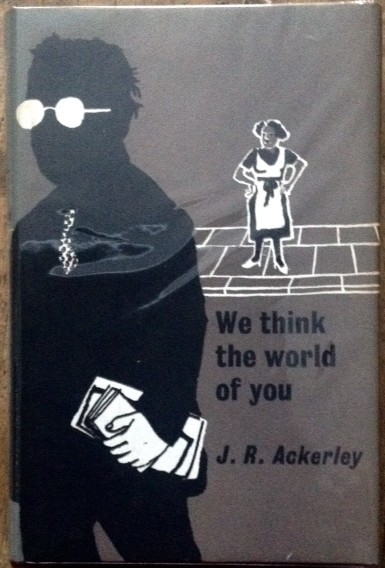Inspiring Older Readers
 posted on 25 Jan 2021
posted on 25 Jan 2021
We Think The World of You by J.R. Ackerley
Ackerley, who died in 1967, built his reputation in the literary world as the editor of The Listener magazine for over two decades. He was something of an unusual public figure in that he was openly gay in a time when it was still illegal to engage in homosexual relationships and We Think The World of You, his only novel published in 1960, uses some of this part of his identity as a gay man to frame the narrative.
Reviews of the novel tend to focus on the ‘love affair’ that develops between the narrator, Frank, a middle class, rather supercilious civil servant and the German Shepherd dog, Evie, who he (reluctantly at first) becomes obsessed with. But this isn’t just a study of the relationship between man and dog but also an often uncomfortable exploration of class snobbery.
Evie is in fact the property of Frank’s erstwhile lover, Johnny, who is a feckless petty criminal who has been sent to prison for housebreaking. The sniffy, pedantic, self-righteous Frank is forced into an uncomfortable proximity with Johnny’s working class family – his rather flighty mother, Millie, her newish fourth husband, Tom, and Johnny’s pregnant wife, Megan – and he channels his frustrations with Johnny and his family into a sort of tug-of-love over the care of Evie.
Frank finds himself besotted with the beautiful young dog and begins to take her out for regular exercise sessions and gradually seeks to take ownership of her. Ackerley was himself fascinated by human-dog relationships and had two years earlier published a study of his own relationship with his own dog, Queenie, in a book entitled ‘My Dog Tulip’ and here he uses that experience to inform the internal monologue of Frank and to give Evie a sort of internal moving spirit of her own.
Ackerley is able to use the battle for Evie’s affection as a surrogate vehicle for exploring the class divisions that will always put Johnny’s family in a condition of suspicion and antagonism towards someone like Frank. It also proves an effective way of stepping back from Frank as the narrator and seeing how insufferably snobbish and affected he is towards them.
In many ways this is a slight novel but in the 150 pages or so of the book Ackerley doesn’t over-labour his narrative or outstay his welcome. The atmosphere he generates is often a claustrophobic one – especially those scenes that put us inside the working class house that acts as Evie’s ‘prison’ – but there are moments of real vigour and exhilaration when Evie is allowed to run free.
I am categorically not a dog person and so the fascination – or should I say the love affair - Frank develops with Evie is a bit of a mystery to me. Despite that I can agree with the review of the book that featured in Publishers Weekly when the book was reissued to coincide with the film adaptation in 1988:
“Funny, touching and delightful, this long out-of-print novel (reissued to coincide with the release of a film version) is memorable for its sharp character portrayals and, above all, for its unabashed exploration of the love that unites human and pet.”
A paperback edition of the book is available very cheaply if you’re interested in following up by reading it for yourself.
Terry Potter
January 2021